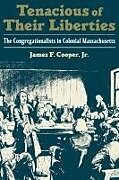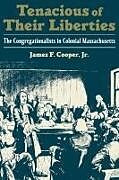Tenacious of Their Liberties
Einband:
Kartonierter Einband
EAN:
9780195152876
Untertitel:
The Congregationalists in Colonial Massachusetts
Genre:
Philosophie & Religion
Autor:
James F. Cooper
Herausgeber:
Oxford University Press
Anzahl Seiten:
296
Erscheinungsdatum:
01.06.2002
ISBN:
978-0-19-515287-6
This study approaches the Puritan experience in Congregational church government from the perspective of both the pew and the pulpit. The author argues that church government did not divide Massachusetts culture along lay-clerical lines, but instead served as a component of a religion and ideology.
This book is a significant contribution to our thinking about Puritanism and its connection to the Revolution.
Autorentext
ABOUT THE AUTHOR James F. Cooper, Jr. is Associate Professor of History at Oklahoma State University.
Klappentext
Although the importance of Congregationalism in early Massachusetts has engaged historians' attention for generations, this study is the first to approach the Puritan experience in Congregational church government from the perspective of both the pew and the pulpit.
For the past decade, author James F. Cooper, Jr. has immersed himself in local manuscript church records. These previously untapped documents provide a fascinating glimpse of lay-clerical relations in colonial Massachusetts, and reveal that ordinary churchgoers shaped the development of
Congregational practices as much as the clerical and elite personages who for so long have populated histories of this period. Cooper's new findings will both challenge existing models of church hierarchy and offer a new dimension to our understanding of the origins of New England democracy.
Refuting the idea of clerical predominance in the governance of colonial Massachusetts churches, Cooper shows that the laity were both informed and empowered to rule with ministers, rather than beneath them. From the outset of the Congregational experiment, ministers articulated--and lay people
embraced--principles of limited authority, higher law, and free consent in the conduct of church affairs. These principles were codified early on in the Cambridge Platform, which the laity used as their standard in resisting infringements upon their rights. By neglecting the democratic components of
Congregationalism, Cooper argues, scholars have missed the larger political significance of the movement. Congregational thought and practice in fact served as one indigenous seedbed of several concepts that would later flourish during theRevolutionary generation, including the notions that
government derives its legitimacy from the voluntary consent of the governed, that governors should be chosen by the governed, that rulers should be accountable to the ruled, and that constitutional checks should limit both the g
Inhalt
Introduction
1: The Implementation of the Congregational Way
2: "A Mixed Form": Clerical Authority and Lay Liberty
3: Lay "Rebellion" and Clerical Reaction: Antinomianism and Its Aftermath
4: The Presbyterian Challenge
5: Congregationalism in Crisis: The Halfway Covenant
6: An Uneasy Balance
7: Declension and Reform
8: Clerical Conflict and the Decline of Sola Scriptura
9: Perpetuation and Disintegration
10: The Great Awakening and the Privatization of Piety
Afterword
Notes
Index

Leider konnten wir für diesen Artikel keine Preise ermitteln ...
billigbuch.ch sucht jetzt für Sie die besten Angebote ...
Die aktuellen Verkaufspreise von 6 Onlineshops werden in Realtime abgefragt.
Sie können das gewünschte Produkt anschliessend direkt beim Anbieter Ihrer Wahl bestellen.
Loading...
Die aktuellen Verkaufspreise von 6 Onlineshops werden in Realtime abgefragt.
Sie können das gewünschte Produkt anschliessend direkt beim Anbieter Ihrer Wahl bestellen.
| # | Onlineshop | Preis CHF | Versand CHF | Total CHF | ||
|---|---|---|---|---|---|---|
| 1 | Seller | 0.00 | 0.00 | 0.00 |
